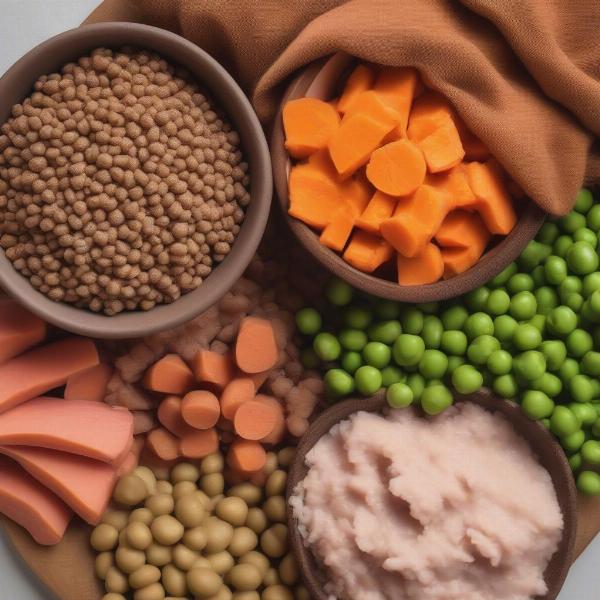Grain-free dog food has become increasingly popular in the UK, with many pet owners believing it offers numerous health benefits. But is it the right choice for your canine companion? This guide will explore the world of grain-free dog food in the UK, helping you understand its benefits, potential drawbacks, and how to choose the best option for your dog’s unique needs.
Understanding Grain-Free Dog Food
What exactly is grain-free dog food? Simply put, it’s dog food formulated without grains like wheat, corn, rice, barley, and oats. These grains are often used as fillers in traditional dog foods, providing carbohydrates for energy. Grain-free dog foods replace these grains with alternative carbohydrate sources like potatoes, sweet potatoes, peas, lentils, or tapioca.
 Grain-Free Dog Food Ingredients
Grain-Free Dog Food Ingredients
Many pet owners choose grain-free dog food believing it’s more natural and closer to a dog’s ancestral diet. While dogs can indeed thrive on a grain-free diet, it’s important to remember that modern dogs have evolved to digest various ingredients, including grains.
Benefits of Grain-Free Dog Food
Some dogs experience allergies or sensitivities to certain grains. Grain-free diets can alleviate these issues, resulting in healthier skin, a shinier coat, and improved digestion. For dogs with sensitive stomachs, grain-free options can often reduce bloating and gas.
Grain-free diets often have a higher protein and fat content, providing more concentrated energy, which can be beneficial for active dogs. This also helps maintain muscle mass and can contribute to a healthy weight.
Potential Drawbacks and Considerations
While grain-free dog food can be beneficial for some dogs, it’s crucial to be aware of potential drawbacks. In recent years, there has been a link between grain-free diets and dilated cardiomyopathy (DCM) in dogs. More research is ongoing, but it’s essential to discuss this with your veterinarian, especially if you have a breed predisposed to heart conditions.
Another consideration is the cost. Grain-free dog food is often more expensive than traditional kibble due to the higher quality ingredients. Furthermore, not all grain-free dog foods are created equal. Some may be lower in certain nutrients, so carefully check the ingredient list and nutritional analysis.
Choosing the Right Grain-Free Dog Food in the UK
Selecting the right grain-free dog food can seem daunting with the vast array of options available in the UK. Consider your dog’s age, breed, activity level, and any specific dietary needs. Look for high-quality ingredients, a balanced nutritional profile, and a brand that is transparent about its sourcing and manufacturing processes. Consulting with your veterinarian is always recommended before making significant dietary changes.
Conclusion
Grain-free dog food can be a viable option for some dogs in the UK, particularly those with grain allergies or sensitivities. However, it’s essential to be informed about the potential risks and to choose a high-quality food that meets your dog’s individual needs. Always consult with your veterinarian before switching to a grain-free diet to ensure it’s the right choice for your furry friend.
FAQ
-
Is grain-free dog food better for all dogs? No, grain-free dog food isn’t necessarily better for all dogs. It can be beneficial for dogs with allergies or sensitivities, but other dogs may thrive on a diet that includes grains.
-
What are the signs of a grain allergy in dogs? Common signs include itchy skin, excessive scratching, digestive upset, and ear infections.
-
Can grain-free dog food cause heart problems? There is ongoing research into a potential link between grain-free diets and dilated cardiomyopathy (DCM), so it’s important to discuss this with your vet.
-
What are some good alternatives to grains in dog food? Alternatives include potatoes, sweet potatoes, peas, lentils, and tapioca.
-
How can I transition my dog to a grain-free diet? Gradually introduce the new food over several days, mixing it with their current food to avoid digestive upset.
-
Is grain-free dog food more expensive? Yes, it can be more expensive due to the higher quality ingredients often used.
-
Should I consult my vet before switching my dog to grain-free food? Yes, it’s always recommended to consult your vet before making any significant dietary changes for your dog.
ILM Dog is a leading international pet website dedicated to providing expert advice on dog care and nutrition. We offer a wealth of information on various topics, from breed selection and health care to training, nutrition, grooming, and much more. Our expert team is passionate about helping dog owners provide the best possible care for their furry companions. For personalized advice and recommendations on grain-free dog food and other aspects of dog care, contact us at [email protected] or call us at +44 20-3965-8624. Visit ILM Dog today for comprehensive resources and guidance!